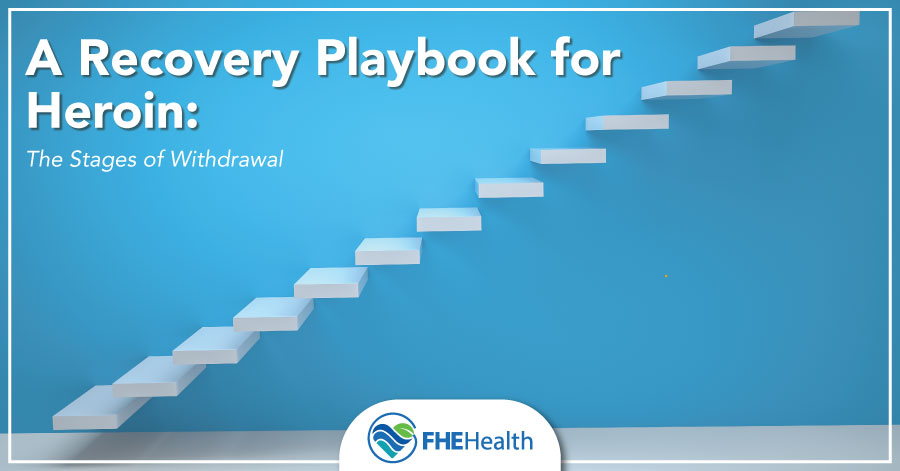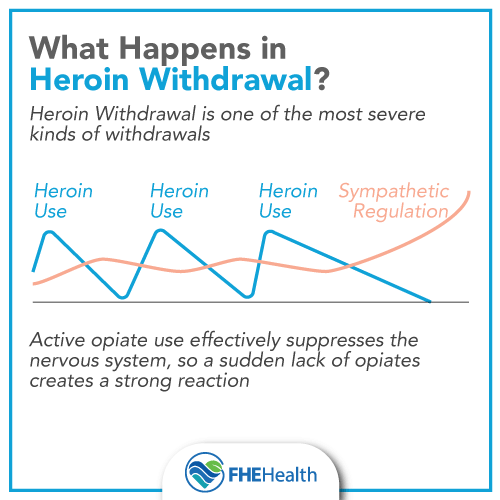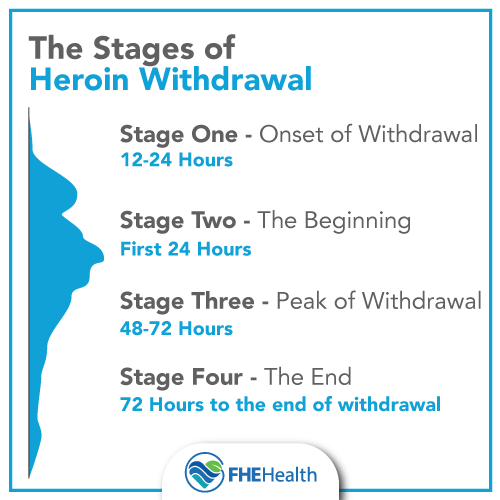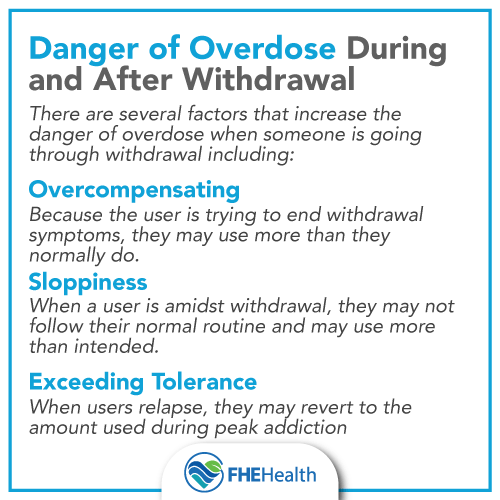
Addiction and recovery are commonly oversimplified. People often think that if someone admits that they have a problem with addiction, that’s the only remaining barrier to getting clean and undergoing successful recovery.
In actuality, there are many reasons why recovery from substance addiction is extremely complicated. One of the largest complications to successful recovery is detox and the accompanying process of withdrawal.
There are countless reasons to fear detox, and heroin withdrawal is notoriously jarring. It is the reason why many people addicted to heroin and other opiates choose to continue using, even when they realize the benefits that getting clean will bring to their lives.
In this piece, we walk step-by-step through the stages of heroin withdrawal, addressing some common experiences and presenting strategies to counteract the symptoms.
What Is Withdrawal?
As you use an addictive substance, it creates a dependency in your system. Different substances take hold using different pathways, but generally, they convince the brain, through exposure and adaptation, that you need a specific drug to function.
Withdrawal syndrome, known commonly just as “withdrawal,” occurs when your body suddenly stops getting the substance in question. A physical reaction occurs in response to the sudden lack of the substance, and functions that were suppressed while using the drug suddenly become overactive.
Specifics of Heroin Withdrawal
 Withdrawal from heroin and other opiates is more severe, due in part to the fact that the drug is more powerful than some others. Heroin, morphine, fentanyl and prescription painkillers effectively suppress the nervous system completely, meaning that the response to a sudden lack of opiates makes the system react in a harrowing way.
Withdrawal from heroin and other opiates is more severe, due in part to the fact that the drug is more powerful than some others. Heroin, morphine, fentanyl and prescription painkillers effectively suppress the nervous system completely, meaning that the response to a sudden lack of opiates makes the system react in a harrowing way.
The channel in which heroin and similar drugs affect the brain is through parts of the brain called opioid receptors. When molecules of an opiate like heroin enter the brain, they bind to two parts of these receptors, one that activates a response and the other that decreases the presence of a substance called GABA, which inhibits dopamine.
Other molecules of the opiates bind to dopamine receptors, releasing dopamine, the substance that causes feelings of pleasure and euphoria. The therapeutic purpose of drugs like morphine and prescription opioids is that this chemical process dulls the body’s response to pain. When people misuse opiates, they enter a sort of dream-like, comatose state.
This chemical process is important to understand for two reasons:
- It gives insight into the process of heroin withdrawal. When parts of the brain are satisfied by new chemicals, they begin to adapt to this change and expect it.
- The other reason is something we’ll come back to — the drugs that use this chemical process can benefit a patient during detox with medication-assisted treatment.
The Stages of Heroin Withdrawal
Withdrawal from some substances is very predictable and takes place over a series of discrete stages. The stages of heroin withdrawal are not so clear, but generally, the process takes the following path to completion.
Stage 1: Onset of Heroin Withdrawal
Unlike some substances, there is no set time after a person’s last heroin use when the symptoms of withdrawal start to kick in. With heroin, it depends on the amount of the dose, but typically withdrawal will begin in 12 to 24 hours.
With other opiates, this timeline varies. Extended-release pain medications have a longer chemical half-life, for example, so withdrawal symptoms may take as long as 36-48 hours to kick in.
Stage 2: The Beginning (the first 48 hours)
The first 48 hours after onset cover the phase in which the symptoms of heroin withdrawal begin to present themselves. The earliest symptoms include worsening nausea, fever, insomnia and muscle aches. Heroin addicts often describe the early days of withdrawal as feeling like the stomach flu, getting worse as time goes on.
Stage 3: The Peak of Heroin Withdrawal (48 to 72 hours)

- Stomach cramps
- Fever, chills and sweating
- Vomiting
- Elevated and irregular heart rate
- Elevated blood pressure
This is also when the psychological aspects of heroin withdrawal reach their peak, and this shouldn’t be overlooked. Heroin users report incredibly intense cravings for heroin during this stage. Combined with the fact that taking heroin at this time provides instant relief from the severe physical symptoms, this is the point where most relapses occur during the process of detox.
Stage 4: The End (72 hours to the end of withdrawal)
If a patient can make it through the peak of heroin withdrawal, the symptoms — both physical and mental — become less severe over the coming days, until the drug’s effects are out of the body.
It should be noted that this doesn’t mean cravings for heroin and other opiates subside completely, just that the body’s physical need for these substances has passed.
The Dangers of Heroin Withdrawal
Heroin withdrawal is severe and uncomfortable but doesn’t carry quite the risk of fatality that withdrawal from other substances does. Some cases may complicate a patient’s health, however.
A Heightened Risk of Overdose

When relapses do occur, the risk for overdose is at its highest because of the danger that a user may take too much of the drug. Their tolerance is lower, meaning that taking the same amount that they had been taking immediately before beginning their detox has the potential to cause an overdose.
While local authorities are building up their supplies of Narcan and other life-saving heroin overdose interventions, these are only helpful if there is a witness to an overdose or if it happens in public. Because most addicts relapse in private, overdoses that occur under these circumstances are thought to carry a higher risk of death.
Counteracting the Symptoms During the Stages of Heroin Withdrawal
There are several ways to counteract the symptoms of heroin withdrawal.
Medication-Assisted Treatment
Using medication to accompany detox is certainly not a new practice, but the drugs used for MAT are more effective than they were in the past. Where methadone, a full opioid, was once the drug of choice for assisting in detox, drugs containing buprenorphine have taken its place.
The latter is a partial opioid agonist, meaning it competes with opiate molecules in the brain and creates a dull version of the same effects that heroin, morphine and similar drugs have on the user.
Common drugs used for heroin detox are Suboxone®, Vivitrol, and Subutex.
Medical Detox
Medical detox involves the process of undergoing withdrawal under the watchful supervision of doctors and other medical professionals. Most often, this occurs at a dedicated detox facility or as a part of the process of inpatient treatment. Facilities like FHE Health can make patients as comfortable as possible, allowing for better odds of successful detox.
Heroin Detox at FHE Health
Undergoing withdrawal from heroin is nearly impossible if you attempt it on your own. If you or a loved one is trying to find lasting recovery from heroin or other addictive substances, contact FHE Health and learn about your options for effective treatment.






